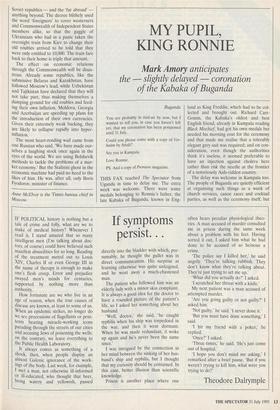If symptoms persist.. .
IF POLITICAL history is nothing but a tale of crime and folly, what are we to make of medical history? Whenever I read it, I stand amazed that so many intelligent men (I'm talking about doc- tors, of course) could have believed such manifest absurdities for so long. Reading of the treatment meted out to Louis XIV, Charles II or even George III in the name of therapy is enough to make one's flesh creep. Error and prejudice swayed men's minds for centuries, supported by nothing more than authority.
How fortunate are we who live in an age of reason, when the true causes of disease are known, at least to some of us. When an epidemic strikes, no longer do we see processions of flagellants or peni- tents bearing miracle-working icons parading through the streets of our cities and accusing Jews of poisoning the wells: on the contrary, we leave everything to the Public Health Laboratory.
It always comes as something of a shock, then, when people display an almost Galenic ignorance of the work- ings of the body. Last week, for example, I met a man, not otherwise ill-informed or ill-educated, who thought that beer, being watery and yellowish, passed
directly into the bladder with which, pre- sumably, he thought the gullet was in direct communication. His surprise at learning otherwise was quite unfeigned, and he went away a much-chastened man.
The patient who followed him was an elderly lady with a minor skin complaint. It is always a good idea for the doctor to have a rounded picture of the patient's life, so I asked her something about her husband.
`Well, doctor,' she said, 'he caught syphilis when his ship was torpedoed in the war, and then it went dormant. When he was made redundant, it woke up again and he's never been the same since.'
I was intrigued by the connection in her mind between the sinking of her hus- band's ship and syphilis, but I thought that my curiosity should be contained. In this case, better illusion than scientific knowledge.
Prison is another place where one often hears peculiar physiological theo- ries. A man accused of murder consulted me in prison during the same week about a problem with his feet. Having sorted it out, I asked him what he had done to be accused of so heinous a crime.
`The police say I killed her,' he said angrily. 'They're talking rubbish. They don't know what they're talking about. They're just trying to set me up.'
`What did you actually do?' I asked. `I scratched her throat with a knife.'
My next patient was a man accused of attempted murder.
`Are you going guilty or not guilty?' I asked him.
`Not guilty,' he said. 'I never done it.' `But you must have done something,' I said.
`I hit my friend with a poker,' he replied.
`Once?' I asked.
`Three times,' he said. 'He's just come out of hospital.'
`I hope you don't mind me asking,' I remarked after a brief pause. 'But if you weren't trying to kill him, what were you trying to do?'
Theodore Dalrymple


















































 Previous page
Previous page